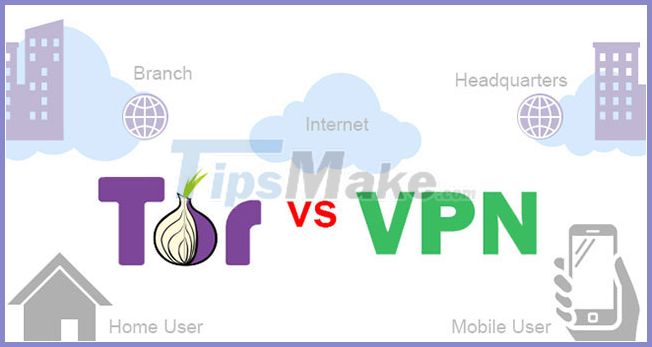Difference between Tor and VPN
When it comes to online privacy, the first two names that appear in the head of the majority of users are Tor and VPN. Both are the most powerful online security tools you can use today.
In a way, you can see they are quite similar. But in fact, these two tools are not exactly the same, even there is a huge difference. So, if you are looking for a new security tool for yourself, then you need to understand the difference between Tor and VPN to make the right decision.
Difference between Tor and VPN
 Both Tor and VPN are the most powerful online security tools available today
Both Tor and VPN are the most powerful online security tools available today Tor
Tor provides anonymity, because your Internet activity is routed through thousands of dedicated Tor servers around the world, making it difficult to track activity back to your computer.
However, the Tor network does not take additional measures to protect your data from hackers. It only routes data so that they are less likely to be tracked.
Visiting some websites on Tor can easily infect malware onto your computer. In fact, many would recommend not exploring many websites on Tor.
VPN
With a VPN account, your Internet browsing experience is exactly the same as expected. You just need to create a tunnel for your operation through the VPN server network nationwide or worldwide.
When using a VPN account, your real IP address is always hidden. Your IP address also cannot be blocked, traced or tracked.
A VPN is not a substitute for an Internet service provider. It works with ISPs and the Internet by creating a special tunnel for your data to move securely. A VPN is basically a data network inside another network (Internet) that hackers can't gain access to.
VPN Tor Speed ✓ x Compatibility with all devices ✓ x P2P file sharing ✓ x Full anonymity x ✓ Secure online connections ✓ x Pricing ✓ ✓ Easy to set up and use ✓ ✓ Ability support group accessibility ✓ xShould VPN and TOR be used at the same time?
Yes, you can use both Tor and VPN at the same time. But VPNs are often faster than Tor, using them together will slow down your internet connection. Read the article: Should you use Tor and VPN together? For more details.
Tor and VPN: Which is the right choice for you?
 Actual needs will help you decide whether to choose Tor or a VPN
Actual needs will help you decide whether to choose Tor or a VPN If you are more concerned about your online identity then Tor is better, but if you like the speed, the ability to share P2P files, access the support team, you can use a VPN. There are several benefits of choosing a VPN, including:
- Speed : VPN is usually faster than Tor because messages only go through a VPN server instead of 3 Tor nodes.
- Compatibility with all devices : VPN operates with a wider range of devices than Tor. In particular, as of today, Tor doesn't work with Apple's iOS. If you use an iPhone or iPad, Tor won't be an option.
- P2P file sharing : VPN is more suitable for sharing P2P files or watching videos.
- All online connections are protected : The VPN will protect all your Internet connections. Tor only protects connections that are designed to use the Tor network.
- Easy to set up and use : VPN is extremely easy to set up. All you have to do is download the software to your computer and run it whenever you need protection.
- Access to the support team : Because VPN providers are big companies, they often have useful frequently asked question pages, as well as support groups if you encounter any problems.